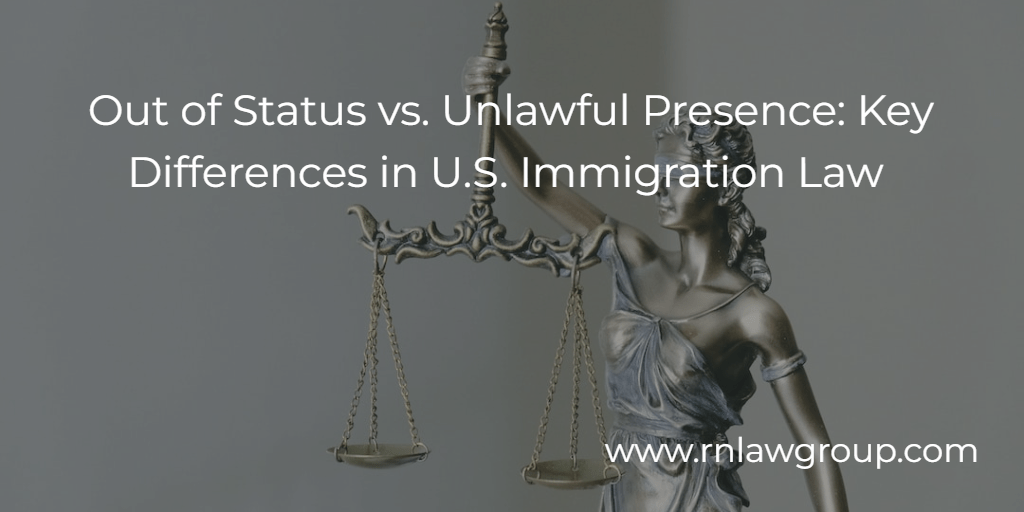
Out of Status vs. Unlawful Presence: Key Differences in U.S. Immigration Law
Understanding the nuances of immigration law in the United States can be complex, particularly when it comes to differentiating between “out of status” and “unlawful presence.” These terms are often used interchangeably but have distinct meanings with significant implications, especially concerning the 3-year and 10-year bars on re-entry.
What Does “Out of Status” Mean?
Being “out of status” in the U.S. refers to failing to adhere to the conditions of your visa or legal status. This could include actions like overstaying the period granted on an I-94 form, working without proper authorization, or failing to maintain full-time enrollment in an educational institution for those on student visas.
The consequences of being out of status are severe: it can render the current visa void, make the individual ineligible for work permits or other immigration benefits, and potentially lead to deportation. However, it’s crucial to note that being out of status, by itself, does not automatically start the clock on “unlawful presence.”
Understanding Unlawful Presence
“Unlawful presence” begins when a person stays in the U.S. beyond the period authorized by the Department of Homeland Security or if they were never lawfully admitted or paroled into the country. It’s this unlawful presence that triggers the 3-year and 10-year bars on re-entry.
The 3-Year Bar: If a person accumulates more than 180 days but less than one year of unlawful presence and then departs the U.S., they face a 3-year bar from re-entering the country.
The 10-Year Bar: If the unlawful presence exceeds one year, the individual is barred from re-entry for 10 years.
These penalties are significant, applying only if the individual leaves the United States and then attempts to return, such as when applying for a green card or visa through a U.S. consulate.
The Key Differences
The primary distinction between being out of status and accruing unlawful presence lies in the nature of the violation and its duration. You can be out of status without necessarily accruing unlawful presence. For example, if you have a pending request for an extension or change of status, you might be out of status but not accruing unlawful presence until a decision is made on your case.
However, once you start accruing unlawful presence, you are, by definition, also out of status.
Navigating the Legal Landscape
It’s important for immigrants and nonimmigrants in the U.S. to understand these distinctions to avoid the severe consequences that can arise from both being out of status and accruing unlawful presence. Individuals facing these situations should consult with experienced immigration attorneys to explore their options, which might include applying for an extension, change of status, or in certain cases, adjustment of status.
Navigating U.S. immigration law’s complexities requires careful attention to the specific details of each case. Understanding the difference between being out of status and unlawfully present can be the key to making informed decisions and avoiding the harsh penalties associated with these conditions.
For more information, or for a detailed conversation regarding Out Of Status Vs. Unlawful Presence: Key Differences In U.S. Immigration Law, please schedule a time to speak here
By: Rahul Reddy
Rahul Reddy, a seasoned lawyer in the realm of employment-based immigration, is the founding partner of Reddy & Neumann PC. With an impressive career spanning over 28 years, he inaugurated the firm in 1997, bringing a wealth of knowledge and a unique perspective to the intricate landscape of immigration law.
Rahul’s understanding of the complexities inherent in the immigration system is vast and nuanced, making him an indispensable resource in this specialized field. This comprehensive expertise, coupled with his personal encounters with the immigration system, has imbued him with a profound empathy for his clients. Each case he undertakes is informed by this personal connection, as he understands the unique challenges and aspirations that drive individuals to navigate the immigration process.
Passionate and committed, Rahul is driven by a desire to assist others in realizing the quintessential American Dream. His mission, underpinned by years of professional experience and personal insight, remains focused on providing excellent legal support to those seeking employment-based immigration solutions.

